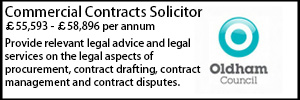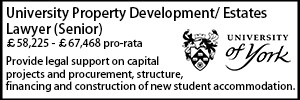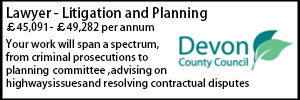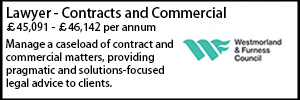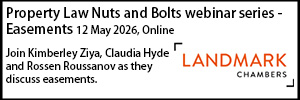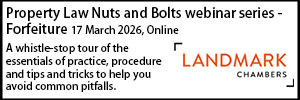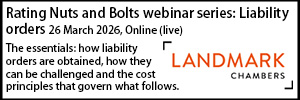Penalty charge notices and unjust enrichment
- Details
Recently there has been renewed interest in Penalty Charge Notices (PCNs) issued by London boroughs in respect of bus lane contraventions, amongst other contraventions. A new line of attack is being deployed, and it is neither restricted to bus lane contraventions nor to just London boroughs, writes Adam Rulewski.
This article aims to highlight the issue, and to give some insight for those councils who have issued PCNs and are being faced with these challenges which are often directed at the officer and political leadership.
The argument (which is wrong for reasons I will set out) at a high level runs as follows. The proponents of the argument say that because a PCN has been cancelled following a successful appeal on any myriad technical grounds, this means that all PCNs issued with that defect are unlawful and must be refunded if they have been paid. It is asserted, wrongly, that the council has benefitted from unjust enrichment in these circumstances.
The genesis of the argument arose following problems with authorisation of bus lane cameras within London, and it is in that context that it is being deployed across London. This article will focus on those circumstances, but the broad principles apply across the board in respect of any PCNs.
Bus Lane ‘Type Approval’
In early 2023, a Judicial Review Pre-Action Protocol Letter was issued to all London Councils, Transport for London and others. The Claim was asserted by a self-appointed proponent of motorist rights. One cannot argue with his underlying motives; councils must get things right. I think that is something we all try to achieve within our own authorities.
The Claim was prompted following a decision at London Tribunals, the decision of Davy Duthieuw v London Borough of Ealing [2022] [Link: DUTHIEUW v LB Ealing.pdf (londontribunals.gov.uk)]
The appeal concerned the admissibility of evidence, for the purposes of an appeal before the Tribunal, which has been produced by a bus lane camera. A dichotomy arose between devices being “prescribed” for the purposes of issuing a PCN, and being “approved” for the purposes of producing evidence admissible before the Tribunal. Due to what appears to have been an administrative error or oversight, devices in London had been “prescribed” (and could lawfully issue PCNs), but had not been “approved” (and therefore could not produce admissible evidence). This arose out of the different legislation being used inside and outside of London.
Section 4(1) of The London Local Authorities Act 1996 (“the 1996 Act”) empowers London councils to serve a PCN for a bus lane contravention on the basis of information provided by the use of a “prescribed device”. Section 3(1) of the 1996 Act defines a prescribed device as a device prescribed under Section 20(9) of The Road Traffic Offenders Act 1988 (“the 1988 Act”) or a device of a description specified in regulations made for the purposes of Section 3(1). It was common ground that bus lane cameras are “prescribed” by The Road Traffic Offenders (Additional Offences and Prescribed Devices) Order 1997.
Crucially, it was not disputed (and could not have been disputed) in Ealing that PCNs are correctly served if served on the basis of information provided by the use of a prescribed device. This fact is conveniently ignored by proponents of the ‘unjust enrichment’ argument.
The problem (now rectified as of February 2023) was that under Paragraph 7(2) of Schedule 1 of the 1996 Act, a camera clip was only admissible as evidence of a “fact relevant to proceedings” if it was produced by “a device of a type approved by the secretary of state”. Approval had not been given.
Approval is given by the Vehicle Certification Agency (‘VCA’). Certificates were issued from the VCA, headed “Transport Act 2000” and “Certification of Approved Devices Under Article 2(b) of the Bus Lanes (Approved Devices) (England) Order 2005” and an explanatory note (“for a device that is not: of a description specified in an order made by the Secretary of State under Section 20(9) of The Road Traffic Offenders Act 1988 (prescribed devices for the purposes of speeding and other offences); nor a device of a type that was used prior to 1 November 2005 for the purpose of bus lane enforcement under Part II (bus lanes) of The London Local Authorities Act 1996.)”). The certificate identified the devices and confirmed “After a review of the information provided in your submitted declaration form, the Secretary of State acknowledges that the device described therein is suitable for civil Bus Lane Enforcement in the London Borough of Ealing area.”
The Tribunal found that the certificate had been issued under The Transport Act 2000 (“the 2000 Act”) and The Bus Lanes (Approved Devices) (England) Order 2005 (“the 2005 Order”), i.e. for legislation outside of Greater London (for the purpose of brevity I won’t recite all of the legislation, but that is the ultimate effect).
It is apparent that several Greater London Councils, and the VCA, had all been operating under the understanding that the devices had been “approved” for use in Greater London. However, due to the way in which the certificate was produced, the Tribunal found that no “approval” as matter of law had been given under the 1996 Act (i.e. for Greater London) and therefore the evidence was not admissible.
Ultimately this was rectified relatively swiftly and by February 2023, most if not all Boroughs had received their approval. This issue is now purely historical.
The proposed Judicial Review therefore evaporated and was never (as far as the author is aware) commenced against any of the respondents to the Pre-Action Protocol Letter.
Unjust enrichment
One additional element of the Judicial Review letter was a claim that, as councils knew of this issue from approximately November 2022, any income received from PCNs issued from devices which were not “approved”, even if they were “prescribed”, amounted to unjust enrichment. Taking either the November 2022 or February 2023 dates, such a claim via Judicial Review is now out of time.
However, that has not stopped arguments from being advanced against a number of local authorities. In an apparent change of tack, various prominent proponents of the argument are now taking on “clients” who have been issued with PCNs with a view to encouraging a private unjust enrichment claim against the issuing authority by those “clients”. This of course would not be subject to the 3 month Judicial Review time limit, and is instead governed by the 6 year rule under the Limitation Act 1980.
No one has a monopoly of legal knowledge, and as far as I am aware the matter has not received judicial consideration. The question is therefore “open” however I consider such claims to be flawed for the following reasons. I would always urge anyone thinking of bringing such a claim to ensure that they take proper legal advice from an independent and qualified lawyer.
Firstly, the Tribunal in Ealing expressly recognised that so long as the devices are “prescribed”, and PCNs issue pursuant to them are properly issued. Therefore, any such PCNs that are paid (perhaps because the motorist fully accepts they acted in contravention) are closed and the income is properly received. It matters not that if the motorist appealed and if evidence from the camera related to a “fact relevant to the proceedings”, then the evidence would not be admissible and the appeal would succeed.
Secondly, appeals may be brought on several grounds. Some of those grounds may not require evidence from a camera, and therefore such evidence would not be a “fact relevant to the proceedings”. By way of one short example – the motorist may allege they were not the owner of the vehicle at the time of the contravention. In that situation, the question of admissibility of the camera evidence simply would not arise as it would not be relevant to an appeal on the sole grounds that the motorist was not the owner of the vehicle at the time. Assuming then that the motorist loses the appeal and the PCN is upheld, it would be absurd to suggest that the PCN is nonetheless void because evidence from the camera would have been inadmissible in proceedings if the appeal had been brought on wholly different grounds.
Consequently, the proposition that Councils must refund all PCNS issued before proper “approval” was obtained in 2023 simply does not hold weight.
An alternative argument is also being advanced, namely that all PCNs which suffer from any defect must be refunded. One example referred to is a PCN issued in respect of failing to comply with a restriction on vehicles entering a pedestrian zone. Appeals have been allowed by the Tribunal on the basis that the PCN states that if the notice is paid within 14 days of “service” they will be reduced by a specified proportion, whereas they should say that if the notice is paid within “14 days beginning with the date of the notice”. That is a technical defect in the notice (arguably to the benefit of the motorist in any event), and such notices have been cancelled on appeal.
The argument runs that, in these circumstances, all PCNs which have been paid but which also suffer from this defect must be refunded. Again, this cannot hold for the following reasons.
Firstly, this argument misunderstands the basis of liability. Take, for example, the pedestrian zone contravention. A “penalty charge” becomes payable “…if the person driving or propelling the vehicle (a) acts in contravention of a prescribed order, or (b) fails to comply with an indication given by a scheduled section 36 traffic sign” (Section 4(5), London Local Authorities and Transport for London Act 2003). What does this mean? It means that the financial liability (“becomes payable”) of the motorist to the Local Authority arises out of the mere act of contravening the legislation. The “penalty charge” is the financial liability for the breach. The “penalty charge notice” (‘PCN’) is the method by which this liability is conveyed to the motorist. In other words, the PCN notifies the motorist that they have become liable to pay a penalty charge.
The liability to pay does not arises out of the PCN instrument itself. It arises out of the operation of statute. The PCN process is nothing more than a process by which the Council extracts from the motorist the financial liability they have incurred by dint of their contravention of the statute.
The difference between a penalty charge for which a person is liable, and a penalty charge notice, is clear from the wording of the statue (i.e. s4(2) “…may serve a penalty charge notice in relation to a penalty charge payable by virtue of s4(5)”). They are two distinct concepts.
Section 4(8) then sets out the various requirements of a penalty charge notice. There then follows various representation, appeal, charge certificate and enforcement processes.
Of course, a motorist may well pay the penalty charge upon the receipt of a PCN, even if that PCN is technically defective. They may well accept that they acted in contravention of the legislation and properly should pay the notice. In those circumstances it is hard to see how such payment can amount to “unjust enrichment”.
Secondly, the existence of a ground of appeal does not automatically render the PCN invalid, cancelled, void or otherwise of no legal effect. They simply provide a ground on which a person may appeal against the notice. They may, of course, also choose to pay the penalty charge. If the PCN is successfully appealed and cancelled, that simply brings to an end the PCN and any consequent procedures. It prevents the council from enforcing the liability to pay the penalty charge. It does not impinge upon the underlying liability itself.
For all these reasons, any argument in relation to “unjust enrichment” are, in the views of the author, ill-founded.
It is hoped that this article provokes some thought on the issues for those councils who are receiving such demands for repayment of historical PCNS.
Sponsored articles
Walker Morris supports Tower Hamlets Council in first known Remediation Contribution Order application issued by local authority
Unlocking legal talent
Senior Solicitor - Property
Legal Officer
Locums
Poll












